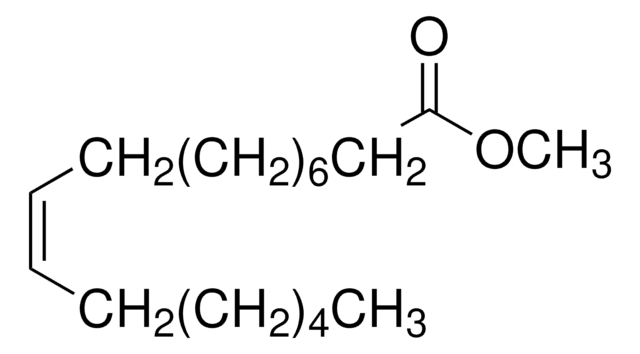M3650
Methyl myristoleate
≥98.5% (capillary GC), liquid
Synonym(s):
Methyl cis-9-tetradecenoate, Myristoleic acid methyl ester
About This Item
Recommended Products
biological source
synthetic (organic)
Quality Level
Assay
≥98.5% (capillary GC)
form
liquid
functional group
ester
lipid type
unsaturated FAs
shipped in
ambient
storage temp.
−20°C
SMILES string
[H]\C(CCCC)=C(/[H])CCCCCCCC(=O)OC
InChI
1S/C15H28O2/c1-3-4-5-6-7-8-9-10-11-12-13-14-15(16)17-2/h6-7H,3-5,8-14H2,1-2H3/b7-6-
InChI key
RWIPSJUSVXDVPB-SREVYHEPSA-N
Looking for similar products? Visit Product Comparison Guide
Packaging
Storage Class Code
10 - Combustible liquids
WGK
WGK 3
Flash Point(F)
Not applicable
Flash Point(C)
Not applicable
Personal Protective Equipment
Certificates of Analysis (COA)
Search for Certificates of Analysis (COA) by entering the products Lot/Batch Number. Lot and Batch Numbers can be found on a product’s label following the words ‘Lot’ or ‘Batch’.
Already Own This Product?
Find documentation for the products that you have recently purchased in the Document Library.
Customers Also Viewed
Our team of scientists has experience in all areas of research including Life Science, Material Science, Chemical Synthesis, Chromatography, Analytical and many others.
Contact Technical Service















